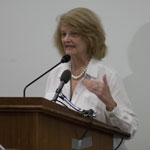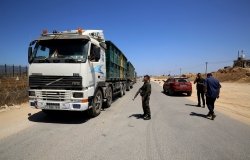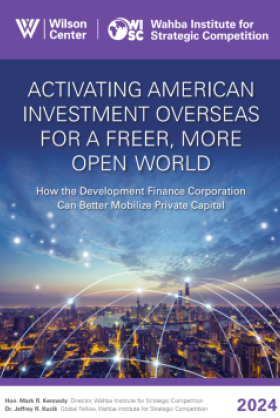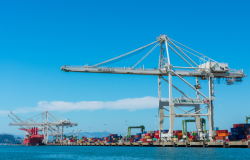The Arab Spring: The Changing Landscape and Implications for Development
David Ottaway, who covered the Middle East for The Washington Post, will provide an overview of recent activities in the region and their impact on the political and economic landscape. Margot Badran, a scholar on the Middle East, will share her insights on the events in Egypt and provide a perspective on Egypt’s path to development. They will also examine what implications this may have for the U.S. relationship with the region.
Overview
A revolutionary wave of demonstrations and protests has been taking place across the Middle East since last December. Wilson Center on the Hill hosted a discussion with Margot Badran, a Senior Fellow at the Center for Muslim-Christian Understanding, Georgetown University and Senior Fellow at the Wilson Center, and David Ottaway, Senior Scholar at the Wilson Center focused on the Arab Spring and the recent developments that have made a strong impact on the political and economic landscape in the region. Michael Van Dusen, Executive Vice President at the Wilson Center, moderated the discussion.
Ottaway began by noting that there were varied responses to revolt among the eight monarchies in the Arab world. The general reaction has been to raise government salaries, keep subsidies, and give bonuses to workers. However, there were some extreme responses as well. He pointed to Saudi Arabia and Bahrain-the two countries that are vital to U.S. interest in regards to oil and security cooperation- as examples of monarchies that crushed any signs of revolt. Bahrain provides the home port for America’s fifth fleet that provides considerable stability for the oil-rich Persian Gulf. As a result, Bahrain poses a real dilemma for the Obama administration in terms of United States’ long standing commitment to democratic ideals. There is an added concern that a shift to electoral democracy would bring a Shiite majority to power with possible links to Shiite Iran. He also cited Morocco as a fortunate case; the monarch acted quickly in response to discontent and moved in the direction of democracy.
On Egypt and Tunisia, Ottaway commented that the cost of sustaining the transition to democracy willl be expensive. Tourism sectors in both countries were heavily affected and the unpredictability of economic policy going forward has been hindering business activities. In particular, Ottaway expressed concern that old Arab Socialist tendencies are slowly coming back to Egypt. Although Egypt is getting monetary help from other Gulf countries, especially Saudi Arabia and the United Arab Emirates, Ottaway warned that tough development and economic problems are looming in the country.
Badran had a differing point of view on Egypt and Tunisia. In the case of Egypt, she stressed that there was a need to move towards democracy and that the bulk of the population was in bad economic shape to start with. Although the first year or the first presidential term will be difficult, she was content that both Egypt and Tunisia are going in the right direction.
Regarding concerns about religious factions dominating the post-revolt world, Badran commented that the demonstrations in Egypt were all about the nation state; the story was about Egypt. She added that it is interesting to see the “shifting of categories.” The Muslim Brotherhood of today is not the same Muslim Brotherhood that was established in 1928. The youth in Egypt are parting ways with the older generation. With its gender-mixed group and its increasing interactions with secular counterparts, the youth in Egypt are a symbol of progressive change. However, Badran also noted that Tunisia has a more strict division between religious factions. She emphasized that with changes happening in the Arab world, the more conservative religious individuals will have to adjust to play in a democratic society.
Following Badran’s remarks, Van Dusen added that the regimes in Syria, Egypt, and Tunisia all have peasant roots. Over time, the power groups have forgotten where they came from and that is the dynamic of the protests that played out in these countries. He also stressed the size of Egypt and its large influence in the region; the population in Tunisia is only half the size of Cairo. Lastly, Van Dusen pointed out that the military is going to be a strong force in the near term. In particular, the military in Egypt is a state within a state. He noted it will be interesting to see what the future role for military will be in the post-uprising Egypt.
only half the size of Cairo. Lastly, Van Dusen pointed out that the military is going to be a strong force in the near term. In particular, the military in Egypt is a state within a state. He noted it will be interesting to see what the future role for military will be in the post-uprising Egypt.
On the question of whether the rise of Muslim Brotherhood will upset the balance of a secular state in Egypt, Badran answered that it is highly unlikely because the Muslim Brotherhood is also aware that too religious of a state will create many political and economic problems. On the potential dangers of Iranian influence in the rebuilding of Egypt, both speakers agreed that Iran is still separate and distinct from Egypt and that the focus has been very much on internal factors so far.
In closing remarks, Van Dusen noted that the road ahead may be bumpy and that U.S. relations with Egypt may not be as strong as before. However, he added the United States still has vital interests- oil and security cooperation- in the area and that will be the driving force of maintaining good relations in the region.
By: Hyun Kyong Lee
Kent Hughes, Director, Wilson Center on the Hill
Speakers

Margot Badran
Honorary Fellow, Prince Alwaleed bin Talal Center for Muslim Christian Understanding, Georgetown University

David Ottaway
Former Washington Post Middle East Correspondent
Michael Van Dusen
Former Senior Advisor to the President for Alumni Relations, Woodrow Wilson Center; Former Executive Vice President and Chief Operating Officer, Woodrow Wilson Center
Thank you for your interest in this event. Please send any feedback or questions to our Events staff.










